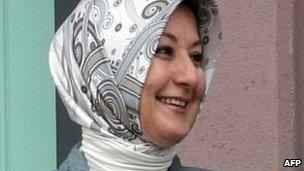Turkish headscarf legal warning by Supreme Court
- Published

Hayrunnisa Gul, wife of President Abdullah Gul, is one of Turkey's best-known headscarf-wearers
Turkey's Supreme Court has warned politicians against a creeping relaxation of restrictions on women wearing headscarves.
It said such a trend violated the secular principles of the constitution.
Opposition parties have been discussing the issue with the governing AK Party, which lost a battle to relax headscarf restrictions two years ago.
Women are banned from covering their heads in many universities and all government offices.
But this year few universities are complying, and the education ministry has said it will back any student flouting the ban.
The main opposition party, the Republican People's Party (CHP), has previously been a staunch defender of the ban but now says it wants a compromise.
But the fiercely secular judiciary is unmoved, the BBC's Jonathan Head reports from Istanbul.
Little stomach for a fight
"Recognition of headscarf use on the basis of religious convictions when regulating the dress codes for university students violates the principle of secularism by using religious fundamentals as a basis for a regulation concerning public space," the Supreme Court said in a statement.
In the past such a statement would have been seen as a call to arms by the top courts, our correspondent says.
But today it is the government that has the whip hand, following the referendum last month which approved important judicial reforms, he adds.
Already one influential council of judges has been restructured, leaving it, say its critics, under the government's thumb.
Additional judges are also being appointed to the Constitutional Court.
Hard-line secularists fear the AKP will now push to end the ban on headscarves in government offices too.
- Published13 September 2010
- Published10 September 2010